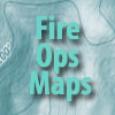Definition: In wildland fire, the condition of being safe; freedom from danger, risk, or injury.
(Merriam-Webster/Fire Research And Management Exchange System)
Wildland firefighters are taught to always consider safety first when combating a wildfire. Loss of life while fighting a wildfire is simply unacceptable, no matter how valuable the resources under protection or at risk. Even seasoned veterans can benefit from review and reinforcement of the principles underlying safety standards, especially when confronted with fires of increasing complexity and risk.

